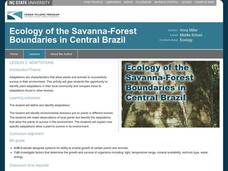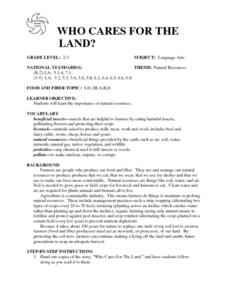Curated OER
The Marvels of Mud
Young scientists roll up their sleeves and get a little dirty in this three-day earth science investigation. Following the scientific method, children monitor the growth of algae in pond water samples in order to determine the role that...
Curated OER
Plant Classification
Students share with the class how they think plants are classified and are assessed on their prior knowledge. They use a packet to complete throughout the week at their own pace, which includes various activities to familiarize...
Curated OER
Vegetation Scavenger Hunt
Young scholars use picture cards to familiarize themselves with plant structures and characteristics. They collect plant specimens without destroying the plant and mount them creating a class herbarium.
Curated OER
Let's Learn About Plants!
Students discover different plants and plant parts by observing their campus. In this plant life activity, students take a guided walk around their school with a magnifying glass examining everyday plants as well as photographing them....
Curated OER
Adaptations
Sixth graders identify plant adaptations. In this adaptations lesson, 6th graders use digital cameras to photograph plants found on their campus. Students describe the adaptations for each plant.
Curated OER
Plant Identification Pictionary
Students participate in a plant identification game. Using worksheets, they collect plant samples and identify the basic parts of the plant. They note the similarities and differences between the various diagrams. They use heavy books...
Curated OER
Classification/Taxonomy/Statistics Review
"Does King Phillip Cry Over Flimsy Grass Stems?" You might not answer that question with this exhaustive worksheet, but your biology class will get the full scoop on the hierarchy of biological classification with this resource. It...
Curated OER
Ecology
Learners explore, experience and experiment identifying the human impact on the environment of vegetative differences within the same biome. They assess what causes deserts, rain forests, savannahs, tundras and saguaros and how these...
Curated OER
Who Cares for the Land?
A very thorough lesson plan focuses on what plants need to grow and stay healthy. There are excellent reading activities and worksheets included in this fine plan. A terrific way to introduce a unit on plants and their needs.
Curated OER
How Does A Seed Become A Plant?
First graders evaluate what it takes for a seed to become a plant. They brainstorm what they know, discuss what they want to know and interact with a Plant WebQuest that indicates what they have learned. They also examine how we get the...
Allegany-Limestone Central School
Plantae WebQuest
Send your young life scientists on a plant webquest that has them reading case studies to decide if seeds are seeds and plants are plants.
Cornell University
Weed IPM
Go on a weed hunt! Scholars gain insight into the characteristics of plants and examine the outdoor environment in order to identify five different types of weeds. Learners then show what they know with a one-page reflection.
Agriculture in the Classroom
Seed Match
Using this resource, your team of green thumbs discuss why plants are a part of a healthy diet and the different ways they are used in daily life. They then observe the characteristics of different seed as they attempt to match them with...
Curated OER
Seed Plant Reinforcement
In this plant worksheet, students contrast gymnosperms and angiosperms by completing a table and using information from their textbook. They also identify 5 plants as either monocot or dicot and complete 3 short answer questions about...
Curated OER
Different Types Of Bugs
First graders create their own bug that contain the different characteristics that a bug can have. In this bugs lesson plan, 1st graders first list 3 - 5 characteristics before they create their bug.
Virginia Department of Education
Classification of Organisms
Searching for the perfect indoor/outdoor activity that allows class members the opportunity to learn about organism classification? Here, pupils research organisms and categorize them according to domain and kingdom over the course of...
Lerner Publishing
Teaching Habitats
What makes up a habitat? Use this resource to engage first graders in the exploration of desert, wetland, forest, and ocean habitats. Youngsters classify plants and animals into the four distinct habitats through drawings and cutting and...
Purdue University
Trees of the Midwest
All trees are not created equal. A set of three wildlife conservation lessons has learners examine the characteristics of individual trees. They look at the life cycle of the tree using a story and reference a field guide to identify...
Curated OER
WET Science Lesson #3: Comparison of Aquatic and Terrestrial Plants
Elementary life science explorers compare and contrast aquatic and terrestrial plants (elodea and soybeans) in a Venn diagram. Some background information is provided to support direct instruction, and general instructions are provided...
Curated OER
The right place to live
How do various plants survive in different environments? They adapt! Kids determine which plant traits make them perfect for their specific environment. They consider three plants and can even complete a plant experiment. Note: Intended...
Desert Discoveries
Amazing Arthropods
Arthropods are the stars of a fine science lesson. Learners look at the diversity, characteristics, adaptations, and important roles that these insects play in the Sonoran Desert environment. A terrific document called "Amazing...
Curated OER
Plant Parts
Students use "Kid Pix" to explore plants. In this science and technology lesson plan, students become familiar with plant parts and label them on a plant. Students tell the functions of each of the plant parts.
Curated OER
Traits of Living Things
In this characteristics of living things worksheet, students will brainstorm five traits of living things and fill in a graphic organizer.
Curated OER
Plant Identification Pictionary
Learners examine ecosystems and the variety of plants and animals that can be found in them. In this plant identification lesson students identify the basic parts of a plant and categorize them according to their characteristics.

























